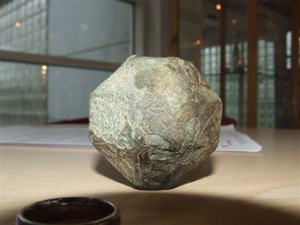
A CHANCE discovery with a metal detector has lead to one of the most significant relics of Scotland’s medieval history being uncovered.
Metal detecting hobbyist George Burns found the pommel of a 13th century Crusader sword lying discarded in a soggy field in Selkirkshire.
This is only the second recorded discovery of a Crusader’s weapon in Scotland, and by far the best preserved.
Now experts at the National Museums of Scotland have confirmed the item as a ‘significant find’, which gives new clues about Scotland’s role in the Crusades.
It’s value as a historical relic is said to be ‘beyond price.’
In January this year Mr Burns unearthed what looked like an old doorknob while coming to the end of a fruitless day of metal detecting.
He said: “I have learned never to throw anything away, so I took it home and washed it down in cold water.”
The stonemason, from Ashkirk, immediately recognised the object as the pommel of a sword, the counterweight at the end of the handle.
He said: “I’d discovered a sword pommel before in the Blainslie are many years ago, so I knew what it was, but the near-perfect condition of what looked like solid bronze, the clarity of its design and its 18 distinct facets really intrigued me.”
Mr Burns, 62, has been metal detecting for the past 16 years.
The pommel has the letters SION inscribed on it, which Mr Burns recognised as referring to Jerusalem.
He showed it to Selkirk historian and author Walter Elliot in spring this year, who confirmed the significance of the find.
The historian was sure the weapon had seen use in the Holy Land.
Mr Elliot said: “When I heard about the SION inscription I immediately thought of the Crusade, but was only too aware there had never been any relics relating to these military campaigns discovered in the Borders.
“Nor has there been any tangible evidence to suggest any of our nobles were involved in the last of the crusades which ended in 1291.
“The etched designs are quite crude but, apart from SION, clearly visible are the letters US REX JUDE, which is a fragment of IEUA NAZARENUS REX IUDEREM of Jesus of Nazareth, king of the Jews.
“The pommels of Crusader’s swords were customised and this inscription was quite common in the 13 century because it was believed to give the user of the sword protection against violent death in battle.”
Mr Elliot first contacted the museum service of Scottish Borders Council, who photographed the pommel.
Last month it was taken to the National Museums of Scotland in Edinburgh.
Experts there have confirmed the provenance of the pommel and acknowledged a ‘particularly interesting find,’ noting that the only similar vestige of a Crusader’s sword, a badly-fragmented pommel, was discovered a few years ago near Ballinbrech Castle in Fife.
The item will now be studied, written up, catalogued and have its value as treasure trove assessed.
Mr Elliot wants the pommel, which he says is ‘beyond price’ to return to the Borders to go on permanent display.
He said: “The Borders was something of a war zone during the Middle Ages, but the sword tells us, I believe, that much of the power was still in the hands of the Norman barons installed by King David 1, who founded abbeys in Melrose and Selkirk in the 12th Century, as feudal lords.
“It is possible the sword belonged to one of these barons, descended from families based in the south of England, who may well have been a Knight Templar and fought in the last Crusade.
“How the sword ended up in a field in Selkirkshire is anyone’s guess, but it could have been symbolically discarded after the Holy Land was lost. It does, however, conjure up the previously unimagined image of at least one knight, in distinctive white mantle with a red cross, riding across the Borderland.”
Mr Burns said: “When what looks like an old doorknob turns out to be part of a Crusader’s sword, it makes it all worthwhile.”